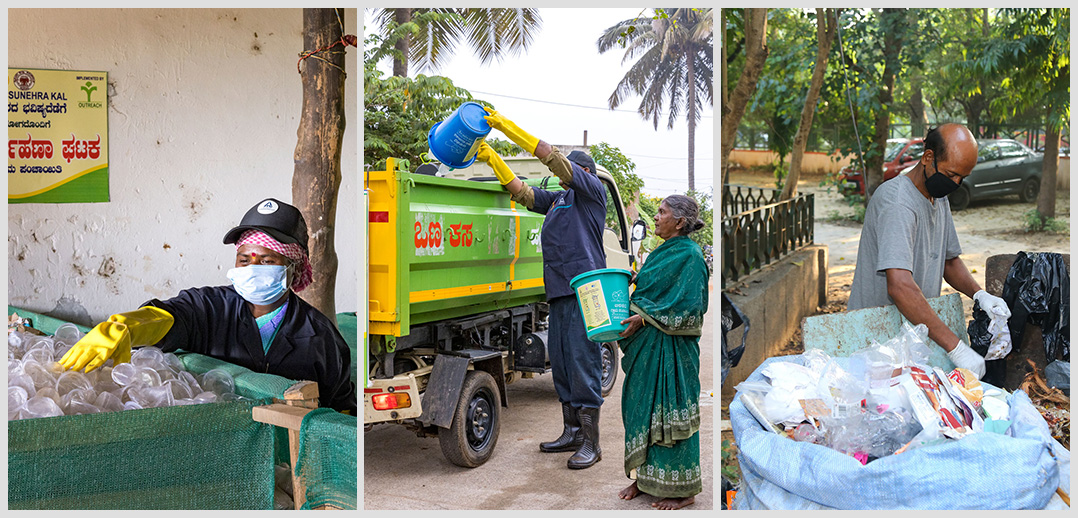
Waste generation in India has soared steeply, a result of many factors - a large and growing population, rapid and unplanned urbanisation and rising consumption levels. However, waste disposal and management infrastructure has lagged severely, creating a massive problem. The traditional method of managing resources, known as the linear economy model or "take-make-dispose," has proven to be unsustainable in the long term due to the rapid depletion of resources and the accumulation of waste. Heaps of waste are a common sight in towns and cities and the majority goes untreated into landfills - a serious public health risk, environmental hazard and an enormous waste of resources.
Proper waste management depends on public behaviour. It requires every citizen to be aware and act responsibly to ensure proper segregation and disposal. Any waste management programme requires focus on building awareness and driving behaviour change among citizens.
Recognising the urgency of the issue, ITC has implemented innovative, sustainable and scalable solutions to tackle the solid waste challenge, including plastic waste. ITC's approach to waste management is based on the principles of circularity, which involves designing products and processes that minimise waste and maximise the value extracted from resources. By adopting a circular approach, ITC is able to reduce its environmental footprint while also achieving greater efficiency and cost savings. ITC also focuses on building awareness and driving behaviour change through training of volunteers called Swachh Doots, who make door-to-door visits to educate families, educating waste workers, conducting school and pubic campaigns.
ITC focuses on reducing waste across its operation through constant monitoring and improvement of efficiencies in material utilisation. ITC also ensures segregation of waste at source and channelising it to suitable recycling streams.
Moreover, ITC is also working towards optimising packaging in a way that reduces the environmental impact arising out of post-consumer packaging waste without affecting product integrity. This is being addressed in a comprehensive manner by optimising packaging design, introducing recycled content in packaging, identifying alternative packaging material with lower environmental impact and supporting development of suitable end-of-life solutions for packaging waste.
ITC's flagship WOW programme is a public private partnership with municipalities and communities that is turning once unsanitary waste threatened neighbourhoods into clean and healthy environments. A unique source segregation and collection pathway, WOW works towards a circular economy, one which re-consumes its waste.
The programme promotes awareness about the importance of source segregation and recycling. It encourages behaviour change, which is critical to sustain a community movement towards reducing pollution.
WOW transforms waste into wellbeing in a sustainable way by rewarding all stakeholders, particularly waste handlers and ragpickers who now have enhanced livelihoods and creates new opportunities for recycling entrepreneurs. Working with common purpose and benefiting all sections of society, WOW is helping to make the national Swachh Bharat mission a reality.
In addition to the WOW initiative, ITC contributes to the Swachh Bharat Mission through its Solid Waste Management (SWM) programme that is part of its Social Investments Programme, Mission Sunehra Kal. ITC's SWM models are based on four key pillars:
The programme has SWM models for towns, villages and temples to manage both wet and dry waste, and minimise waste to landfill.
ITC is working to improve recyclability, optimise packaging, and explore sustainable alternatives to plastic. Additionally, the Company is leveraging synergies between its Life Sciences and Technology Centre (LSTC), and Paperboards & Packaging and FMCG businesses for sustainable packaging solutions.
The Sustainability 2.0 agenda reimagines sustainability under the pressing challenges of climate change and social inequity. It calls for inclusive strategies that can support sustainable livelihoods, pursue newer ways to fight climate change, enable the transition to a net zero economy, work towards ensuring water security for all and create an effective circular economy for post-consumer packaging waste. It also entails protecting and restoring biodiversity and ecosystem services through adoption of nature-based solutions.
With regard to circularity, the Sustainability 2.0 agenda envisages